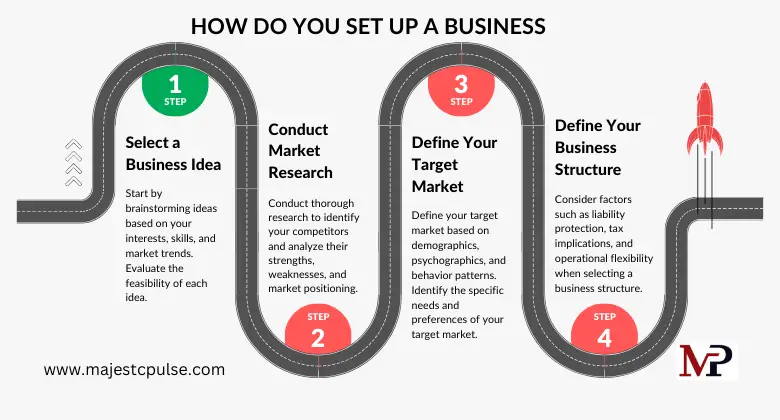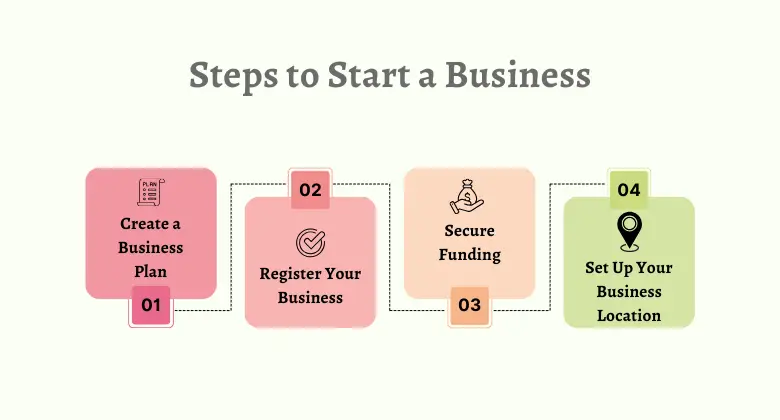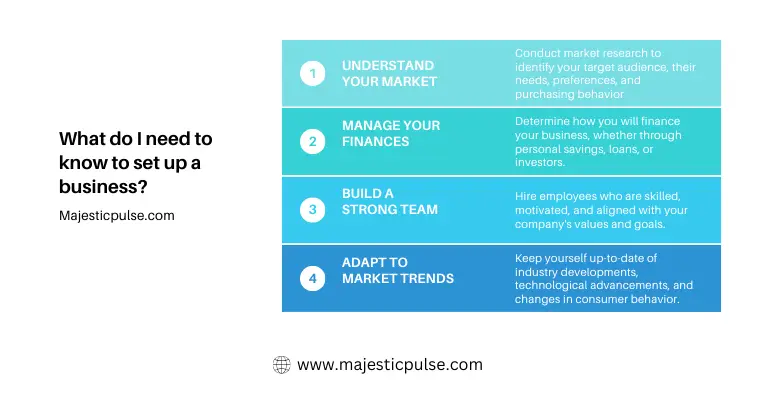Table of Content
ToggleIntroduction
This article is a checklist to start a business in 2024 as starting a business in 2024 is an exciting idea, but it needs careful planning and execution to be successful. One essential tool for aspiring entrepreneurs is a well-planned checklist that outlines the key steps and considerations to start a business. This checklist works like a roadmap to guide you through the process and help you stay organised and focused on your goals.
In this article, a comprehensive “Checklist to Start a Business in 2024” has been presented. It will cover everything from selecting a business idea to registering your business, securing funding, and setting up your business location. Whether you’re an ambitious entrepreneur or new to the business world, this checklist will help you navigate the challenges of starting a business in 2024 and increase your chances of success. Explore more business ideas before going through business checklist.
Read here : https://majesticpulse.com/what-business-should-i-start-a-complete-guide/
How Do You Set Up a Business?

Setting up a business involves several vital steps crucial for a strong foundation for your business. Here, we’ll discuss the checklist to start a business in 2024 in detail, highlighting the key considerations for each step.
1. Selection of a Business Idea
Selecting the right business idea is the first step in setting up a successful business. Start by brainstorming ideas based on your interests, skills, and market trends. Evaluate the feasibility of each idea and consider factors such as market demand, competition, and potential profitability. Your business idea should align with your passion and should have the potential for long-term success.
2. Conduct Market Research
Market research is essential to understand the industry landscape, target audience, and market trends. Conduct thorough research to identify your competitors and analyse their strengths, weaknesses, and market positioning. Use market research findings to refine your business idea and develop a unique value proposition to set you apart from competitors.
3. Define Your Target Market
Defining your target market is essential to effectively tailor your products or services to meet your customers’ needs. Define your target market based on demographics, psychographics, and behaviour patterns. Identify your target market’s specific needs and preferences to ensure that your services or products align with their interests.
4. Define Your Business Structure
Selecting the proper business structure is also essential for legal and financial reasons. Consider liability protection, tax implications, and operational flexibility when choosing a business structure. Common business structures include sole proprietorship, partnership, corporation, and limited liability company (LLC). Consult with legal and financial advisers to determine the most appropriate business structure for your venture.
By following these steps and addressing the above-mentioned critical considerations, you can set up a well-positioned business for success. Each step is crucial in laying the groundwork for your business and ensuring you have a solid foundation to build a successful business.
Steps to Start a Business

Checklist to start a business in 2024 has several vital steps essential for launching a successful venture. Here, we’ll provide the detailed steps to start a business in depth, highlighting the critical requirements for each step.
· Creating a Business Plan
A business plan serves as a roadmap for your business, outlining your business goals, target market, competitive analysis, marketing strategy, and financial projections. Start by defining your business idea and conduct market research to validate your concept. Use this information to create a comprehensive business plan that guides your decisions and helps secure funding from potential investors.
· Register Your Business
Registering your business is crucial in establishing its legal identity and ensuring compliance with regulatory requirements. Determine the legal structure of your business (sole proprietorship, partnership, corporation, LLC) and register it with the appropriate authorities. Obtain any licenses or permits required to operate your business legally in your jurisdiction.
· Secure Funding
Securing funding is often necessary to cover the initial costs of starting a business, such as equipment, inventory, and marketing expenses. Explore funding options such as small business loans, grants, crowdfunding, or investment from family and friends. Develop a detailed financial plan that outlines your startup costs, projected revenue, and funding requirements to present to potential investors.
· Set Up Your Business Location
Setting up your business location involves finding a suitable space to operate your business. Consider location, size, and cost when selecting a business location. If you plan to work from home, ensure compliance with local zoning laws and obtain any necessary permits. Consider a lease agreement that meets your needs and budget if you require a commercial space.
You can start a business successfully by following these steps and addressing the above-mentioned critical considerations. Each step is crucial for laying the foundation for your venture and ensuring you have a solid framework for a reliable business.
Things to Consider to Start a Business

When starting a business, there are several key factors to consider to get success. Here, we’ll discuss important things to consider when starting a business. We’ll cover essential aspects such as legal and regulatory requirements, financial planning and budgeting, branding and marketing strategies, human resources, and hiring.
· Legal and Regulatory Requirements
Complying with legal and regulatory requirements is essential for the smooth operation of your business. Research the legal structure that best suits your business (sole proprietorship, partnership, corporation, LLC) and register your business accordingly. Obtain any licenses, permits, or certifications required for your industry and location. Ensure compliance with tax laws and regulations to avoid penalties or legal issues.
· Financial Planning and Budgeting
Financial planning and budgeting are critical for the financial health of your business. Develop a comprehensive business plan that includes detailed financial projections, startup costs, and operating expenses. Determine how you will fund your business through personal savings, loans, or investors. Establish a budget and monitor your finances closely to ensure you stay on track and can adapt to changing circumstances.
· Branding and Marketing Strategies
Effective branding and marketing strategies are essential for attracting customers and establishing your brand. Define your target market and develop a strong brand identity aligning with your audience’s interests. Create a marketing plan that includes online and offline strategies to reach your target audience. Utilise social media, content marketing, and advertising to promote your business and attract customers.
· Human Resources and Hiring
Building a solid team is crucial for the success of your business. Determine your human resource requirements based on the size and scope of your business operations. Develop job descriptions and recruitment strategies to attract qualified candidates. Consider factors such as employee benefits, training, and development to ensure you have a motivated and skilled workforce. Comply with employment laws and regulations to create a positive and legally compliant work environment.
By considering these factors and addressing the critical aspects outlined above, you can set a strong foundation for your business and increase your chances of success. Each of these considerations plays a crucial role in your business’s overall success and sustainability.
What do I need to know to set up a business?

Setting up a business requires careful planning and consideration of various factors to ensure its success. Here, we’ll address common questions and concerns about starting a business and cover essential aspects such as understanding your market, managing finances effectively, building a solid team, and adapting to market trends.
· Understanding Your Market
Before starting a business, it’s crucial to understand your target market and the demand for your products or services. Conduct market research to identify your target audience, their needs, preferences, and purchasing behaviour. Analyse your competitors to identify gaps in the market that your business can fill. Understanding your market will help you develop a unique value proposition and tailor your products or services to meet customer needs.
· Manage Your Finance
Effective financial management is critical to the success of any business. Create a detailed business plan that outlines your startup costs, operating expenses, and revenue projections. Determine how you will finance your business through personal savings, loans, or investors. Monitor your finances closely and keep track of your cash flow to ensure you can cover expenses and maintain profitability.
· Build a Strong Team
Building a solid team is essential for the growth and success of your business. Hire skilled, motivated, and aligned with your company’s values and goals. Provide training and development opportunities to help your team grow and excel in their roles. Foster a positive work culture that values collaboration, communication, and innovation. A strong team will help you achieve your business objectives and overcome challenges.
· Adapt to Market Trends
The business landscape constantly evolves, so staying updated and adapting to market trends is essential. Keep yourself up-to-date on industry developments, technological advancements, and changes in consumer behaviour. Your business model or strategy should align according to market conditions and customer feedback. By staying flexible and responsive to market trends, you can position your business for long-term success.
Starting a business requires careful planning, strategic thinking, and adoption of changing circumstances. By understanding your market, managing finances effectively, building a solid team, and adapting to market trends, you can set your business up for success and achieve your entrepreneurial goals.
Conclusion
In conclusion, starting a business in 2024 requires careful planning and consideration of various factors. We discussed the importance of having a comprehensive checklist to guide you through the process. Each step is crucial for success, from selecting a business idea to understanding your market, managing finances, building a solid team, and adapting to market trends.
Using the checklist to start a business in 2024 in this article is essential to ensure you cover all crucial aspects of starting a successful business. Following the steps outlined and staying focused on your goals can increase your chances of building a thriving business in 2024 and onwards.




















3 Responses
aut voluptatem vero ipsam est quaerat. veniam adipisci in natus vel veniam quam iste voluptatem repellat blanditiis eaque quo labore quis numquam odio.